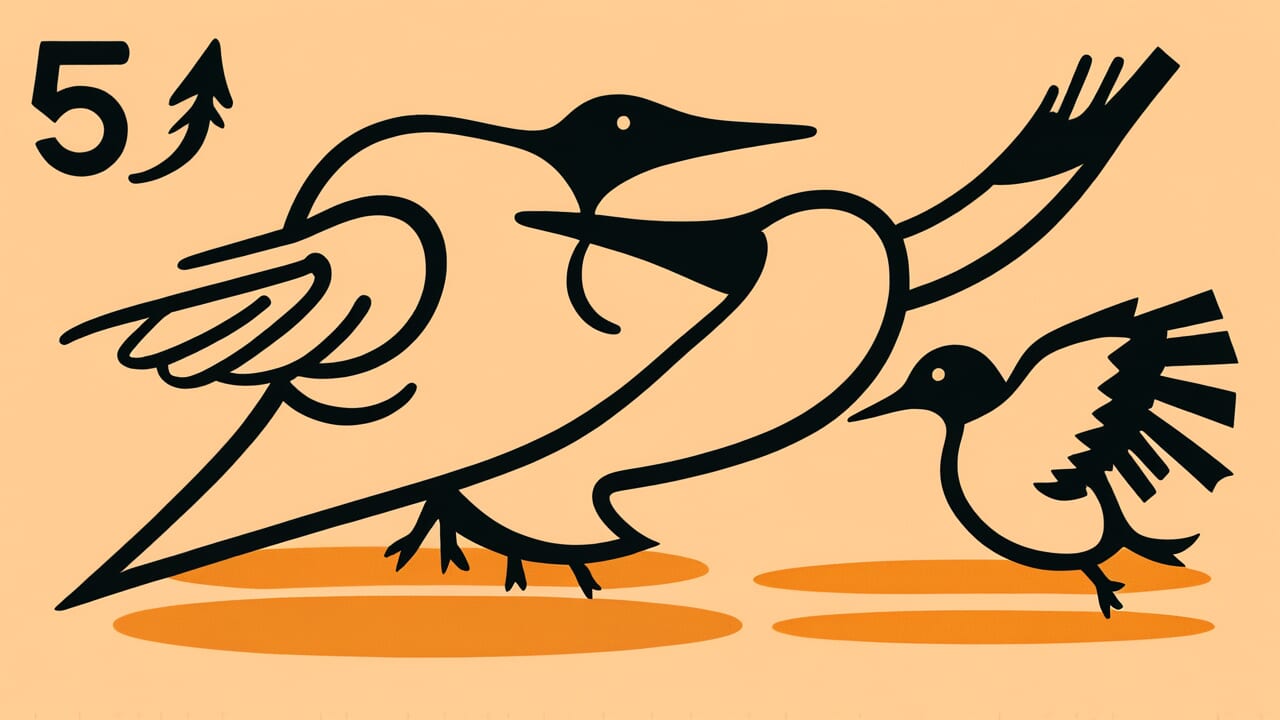How to Read “Eight hundred geese, three arrows”
Gan wa happyaku, ya wa sanbon
Meaning of “Eight hundred geese, three arrows”
This proverb describes a situation where you must face an overwhelming opponent with extremely limited means or people.
It depicts the stark disadvantage of having only three arrows against eight hundred geese. This concrete image conveys the difficulty of a challenge where success seems unlikely.
People use this proverb mainly when they recognize and express that they or their team are in an unfavorable position.
In business, it applies when a small team tackles a huge workload. It also fits when a small company enters a massive market.
Students facing enormous study material with limited time before exams also experience this situation.
Today, this proverb is not just about lamenting numerical disadvantage. It encourages people to analyze difficult situations calmly and think about how to use limited resources effectively.
Origin and Etymology
The exact source of this proverb is unclear. However, its structure suggests it depicts a hunting scene.
Geese have long been known in Japan as migratory birds. In autumn, people across the country saw them arrive in large flocks. These flocks often numbered in the hundreds, which is why “eight hundred” represents a large number here.
The phrase “three arrows” shows the limited number of arrows a hunter carried. In ancient times, arrows were precious tools for hunting.
Making arrows required skill and time. Hunters could only carry a limited number during the hunt.
The specific number three might reflect actual hunting practices. Or it might have been chosen as a symbolic representation of “a small number.”
This proverb depicts a hunter facing a flock of geese that fills the sky with only three arrows. Its strength lies in expressing an overwhelming numerical difference through a concrete, visual image.
We don’t know if it came from actual hunting experience or was created to emphasize numerical contrast. Either way, it represents crystallized wisdom that uses familiar elements—hunting and migratory birds—to express a universal situation.
Usage Examples
- Our new business launch team has only five people, but our competitors have hundreds. It’s truly eight hundred geese, three arrows.
- I have only one week until the exam, but there’s a mountain of material to memorize. It’s an eight hundred geese, three arrows situation.
Universal Wisdom
This proverb has been passed down through generations because humans have always struggled between “the power of numbers” and “the power of quality.”
Throughout history, countless situations have involved the few facing the many. Each time, humans confronted the challenge of overcoming overwhelming disadvantage.
This proverb shows both fundamental human fear and hope. The terror of being overwhelmed by numbers is instinctive.
As animals, humans know that group size often determines victory or defeat. But humans also have wisdom.
The power to think about where to shoot those three arrows and when to shoot them—that is humanity’s strength.
Interestingly, this proverb says nothing about the outcome. It doesn’t say whether you win or lose. It simply describes the situation objectively.
Perhaps this contains a philosophical acceptance that unfavorable situations are part of life itself. When living, everyone inevitably faces difficulties too large for their power to handle.
What matters then, our ancestors teach us, is to grasp the situation accurately and make the most of the power you have.
When AI Hears This
In information theory, higher data redundancy means you can grasp overall characteristics with fewer samples. A flock of 800 geese is actually a highly redundant system.
This means observing any goose gives you almost the same information about “the flock’s overall movement pattern.” Bird flocks behave collectively, so individual differences are small.
Capturing three birds gives you most of the information about the entire flock.
This follows the same principle as modern marketing sampling surveys. To understand 100 million consumers, you don’t need to ask everyone.
Data from 1,000 properly selected people can predict overall trends with over 95 percent accuracy. What matters is “target homogeneity.”
In groups with uniform behavior patterns like goose flocks, approaching a small number yields sufficient results.
Conversely, this proverb shows that “the largeness of 800” actually becomes a weakness. Groups lacking diversity and being predictable are easily conquered with few resources.
Just as companies where everyone thinks alike have their strategies easily read by competitors. Redundancy brings stability but also creates vulnerability.
This reveals a fundamental tradeoff in system design.
Lessons for Today
This proverb teaches you the mindset needed when facing unfavorable situations. In life, moments will definitely come when your abilities, time, or money feel overwhelmingly insufficient.
At such times, don’t just feel lost. First, calmly observe the situation. This is what matters most.
Modern society offers enormous amounts of information and choices. Looking at social media, everyone seems successful, and you might feel left behind.
However, the “three arrows” you hold are your special weapons. You can decide where to aim them.
You don’t need to obtain everything. You don’t need to chase all 800 geese.
What truly matters to you? How far can your arrows reach? Develop the power to discern these things.
Have the courage not to scatter your limited power but to concentrate it on what’s most important. Unfavorable situations are the best opportunities to sharpen your judgment and focus.



Comments